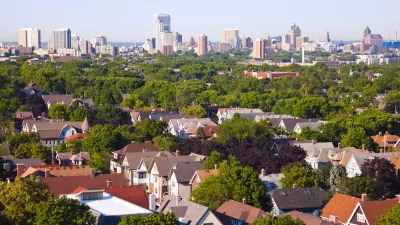State law required an affordable housing plan making its way through the Milwaukee City Council to be drastically reduced in scope.

The city of Milwaukee is moving forward with an amended inclusionary zoning plan that would require city-financed project.
"The proposal would require developers building city-financed apartment buildings with 20 or more units to set aside 20 percent of all new units for residents making less than 60 percent of the county’s median income for a period of 30 years," reports Jeramey Jannene. "An earlier version of the plan impacted both public and privately financed projects."
The decision to only require affordable housing in city-financed projects responds to concerns about state law and a precedent setting decision by the Wisconsin State Supreme Court.
The proposed inclusionary zoning law, as currently written, would "cover part or all of the neighborhoods of East Town, Westown, the Lower East Side, The Brewery, Historic Third Ward and Walker’s Point."
FULL STORY: Affordable Housing Plan Inches Forward

Manufactured Crisis: Losing the Nation’s Largest Source of Unsubsidized Affordable Housing
Manufactured housing communities have long been an affordable housing option for millions of people living in the U.S., but that affordability is disappearing rapidly. How did we get here?

Americans May Be Stuck — But Why?
Americans are moving a lot less than they once did, and that is a problem. While Yoni Applebaum, in his highly-publicized article Stuck, gets the reasons badly wrong, it's still important to ask: why are we moving so much less than before?

Research Shows More Roads = More Driving
A national study shows, once again, that increasing road supply induces additional vehicle travel, particularly over the long run.

Which US Rail Agencies Are Buying Zero-Emissions Trains?
U.S. rail agencies are slowly making the shift to zero-emissions trains, which can travel longer distances without refueling and reduce air pollution.

San Diego School District Approves Affordable Housing Plan
The district plans to build workforce housing for 10 percent of its employees in the next decade and explore other ways to contribute to housing development.

Lawsuit Aims to Stop NYC’s ‘City of Yes’ Zoning Reforms
A lawsuit brought by local lawmakers and community groups claims the plan failed to conduct a comprehensive environmental review.
Urban Design for Planners 1: Software Tools
This six-course series explores essential urban design concepts using open source software and equips planners with the tools they need to participate fully in the urban design process.
Planning for Universal Design
Learn the tools for implementing Universal Design in planning regulations.
City of Moreno Valley
Institute for Housing and Urban Development Studies (IHS)
City of Grandview
Harvard GSD Executive Education
NYU Wagner Graduate School of Public Service
City of Cambridge, Maryland
Newport County Development Council: Connect Greater Newport





























